How a duck, a quack, and an Italian playboy brought me to Barcelona (with my mother)
The haiku version of a true story.
The Fowl Beginning
Sitting in my now-empty Barcelona apartment with its 20-foot-high ceilings crossed with wood beams, the last minutes ticking by of the many years I’ve spent in this gorgeous flat overlooking the marina, I realize that a duck kicked off the events that led me here.
More specifically, a duck, a quack, and an Italian lothario all played key roles in bringing me to this vibrant Mediterranean-hugging city — with my mother.
The duck entered the scenario back when I was living in Thailand fifteen years ago, traveling all over Asia, writing books, books, books, rarely stopping except for the daily phone call to my parents in their Florida retirement community.
During every call, my mother told me about her flowers and the latest luncheons with the neighbor ladies, and my father invariably asked, “How’s Thighland, honey? Have you learned to speak Thigh yet?”
The next day the conversation would repeat, with Mom again talking about flowers — some days African violets, some days tulips — and Dad asking yet again if I’d learned to speak Thigh in between commenting on my books’ amazon.com ratings, which he followed hourly as though they were hot stocks.
Three years into it, the conversations with my parents took two surprising turns. One day Dad stopped inquiring about Thighland, instead asking, “How’s Siam, honey? Have you learned to speak Siamese yet?”
And Mom, who always donned a cheerful voice whatever was happening — World War III could have kicked off in her backyard and she would have still sounded chipper — began sounding positively ebullient.
“Oh, honey, we have a new resident in the neighborhood!” she told me. “The cutest duck! He just showed up out of the blue! Daddy doesn’t like him — he says the duck eats his roses. But I adore him!”
When I called the next day, Dad asked about Siam again and Mom sounded even more thrilled. “I have big news, honey! There’s a new resident in the neighborhood! The cutest duck you ever did see — and he just showed up out of the blue! Daddy says he eats his roses, but I adore him.” I could nearly hear my Dad’s eyes rolling in the background.
The third day when she repeated the exact story almost word for word, I grew concerned. “Mom,” I asked, “did you buy more of that nasty artificial sweetener I threw out when I was there?” I’d read studies linking the faux sugar with memory loss. “Are you putting that stuff in your coffee again?”
“Of course not!” she said. “You told me to stop using it.”
After three weeks of Mom telling me daily about the new resident of the neighborhood, Dad grabbed the phone. “Your mother is losing it!” he announced.
The next day when I called, Dad answered. “Your mother is furious with me,” he began. They’d gone to the doctor — ostensibly to check on Dad’s diabetes, which was very much under control, everything fine. But then Dad told the doctor about Mom’s oft-repeated duck story. “She’s losing it! Give her some pills!”
The doctor turned to my mother, asking about her memory. Mom admitted that she wasn’t as sharp as she used to be, but she declined a memory test and refused any medication.
“She’s my wife and she’s losing it!” said my dad. “I demand that you give her a brain scan and put her on something!”
The doctor explained there was no cure for dementia, any drugs he prescribed wouldn’t have much effect, and if Mom didn’t want an MRI or even a simple memory test, he couldn’t force her to take it — and neither could Dad.
“Then to hell with you!” Dad said and stomped out, stopping by the reception desk to loudly inform that he’d fired his doctor — and neither he nor Mom would continue as his patients.
“But Dad, he’s a great doctor,” I said. This was the GP who’d diagnosed his diabetes and kept it under control. My parents had raved about him for two decades.
“I found a better one,” my father replied.
To wit: on the drive home from the ex-doctor’s office, Dad spotted a billboard of a handsome, young doctor with pearly-white teeth — and jotted down his number. Dad had already made an appointment to see Dr. Billboard; Mom had already announced he wouldn’t be her new doctor.
Dr. Billboard was a very, very busy man given his booming billboard business, and after he discovered that Dad had a premium health insurance policy, he insisted that Dad needed a slew of tests — and also insisted that my father check into the hospital to get said tests (that did not require being hospitalized), simply because it was much more convenient for Dr. Billboard to see Dad during his nightly hospital rounds than at his office.
So Dad kept checking into the hospital — for no good reason — and I kept calling from Thailand and checking him out because the best place to catch something horrible is a hospital, especially if you’re elderly. I also kept calling Dr. Billboard’s office, demanding that he stop checking my father into the hospital for routine testing — hadn’t he heard about superbugs, what the heck was he doing — but Dr. Billboard and his staff ignored me.
This happened dozens of times, making me suspect that Dr. Billboard was a con man and a quack. As for the duck, the original quacker that set this drama in motion when it became the symbol of Mom’s fading memory, it has mysteriously stopped coming around. Both Mom and I believed Dad had everything to do with his disappearance.
The Descent Begins
I flew to Florida and pleaded with Dad to get another doctor because this one was just milking his platinum healthcare plan and putting his health at risk — all the more since he was messing around with my father’s diabetes medications. But Dad thought Dr. Billboard was a god, even though Dad had already picked up a respiratory bug during one of his unnecessary hospital stays.
While back at my parents’ house, I found enough boxes of artificial sweetener to last a short nuclear winter and noted with alarm that Mom was back to using it daily. I once again tossed it out — and Mom stopped repeating things.
Shortly thereafter, I flew to Guatemala for research on a new book, and had been there two days when my mother informed me that my father was back in the hospital: Dr. Billboard had decided that they needed to amputate Dad’s leg.
I caught the next flight back, putting in calls to the surgeon, and yet more ignored calls to Dr. Billboard. When I finally spoke with the surgeon he told me that he did not recommend the surgery, it was way too risky — and even though Dr. Billboard had put my father in the hospital yet again, the surgeon had never agreed to perform the scheduled operation. I went ballistic and forced my father to change doctors. But it was too late.
While Dad was unnecessarily in the hospital waiting for the canceled surgery, he caught a hospital “superbug”: terrible C-Difficile, an antibiotic-resistant bacteria that wreaks havoc on your gut and made nurses treat him like a leper.
Within a few months, the superbug killed Dad — the very scenario I’d been trying to prevent. I was livid and overwhelmed with grief. After Dad died, it felt like gravity stopped existing. Nothing felt solid or reliable or predictable or grounded, nothing made sense anymore with Dad gone.
When people asked the cause of my father’s death I told them a duck and a quack with pearly-white teeth. Confirming my suspicions, shortly thereafter Dr. Billboard slipped out of town, his office closed overnight with no forwarding address or phone number, simply stranding the patients that he hadn’t already killed.
After we buried Dad, my sister inherited his car and I inherited my mother, although I didn’t realize it at first.
Maternal Ward
In the beginning, Mom was holding up pretty well and passed the assorted memory tests I inflicted upon her with flying colors. But without Dad, Mom seemed anchorless, like she was sleepwalking through life.
Even though I was used to constant geographic change, since I’d been traveling the world for the past decade for books, I volunteered to stay with Mom six months a year, wintering in Florida in her retirement community, which certainly wasn’t my cup of tea, but keeping my mother content was worth it.
For the other half of the year, I flew to Barcelona, where I took a sublet in a two-century-old building across from the marina. That was where my real life resumed — the one with writing assignments, beautiful views, handsome men, fab food, and oodles of fun. However, five years into it, our arrangement stopped working.
That fifth year a relative called me in Barcelona, where I’d been for only a month that time, telling me to fly back pronto because Mom was on a food strike and had stopped eating. The night before I left my beautiful sublet apartment, which I was now forced to permanently abandon, my Italian friend Andrea, a good-looking playboy and an impressive cook, stopped by for a final glass of wine on my balcony overlooking the marina.
I told him how I now faced an eternity living at my mother’s culture-free, fun-free retirement community, describing how it was the exact opposite of the lively pedestrian scene of Barcelona. In Mom’s retirement community, there was no marina, no beach, no bars and restaurants every three steps, no street fairs and parades, no dashing lotharios, and nowhere to go besides the mall and mediocre chain restaurants, Friday Happy Hour at Carrabba’s being the weekly highlight. Besides, to get anywhere you had to drive, drive, drive, a lifestyle I abhorred.
“Meli,” Andrea said, “bring your mother to Barcelona.” He gestured to the sweeping view that spilled from the balcony — the sailboats bobbing at the marina, the bars and restaurants lining the pier, the crowds of revelers, the trio of guitarists traveling from terrace to terrace. “There’s so much to look at, so much to do, and the weather is good — she would love it here. And,” he paused for effect, “I will even cook for her!” As if that decided it.
I spent the next hour explaining why that was impossible. Mom was now nearly 90, I couldn’t catapult her from the retirement community she’d lived in for 25 years, I couldn’t risk her wandering out on her own in a city where she knew nobody and couldn’t speak the language, and what if her purse was nabbed or somebody broke in our apartment? Besides, she’d stopped eating. While I appreciated his idea, I told him, it just wouldn’t work.
Escaping an Ill-fated Eternity
However, back in Florida, I reconsidered that prospect. Mom, who’d looked healthy when I’d left, appeared emaciated upon my return, having lost 20 pounds in the few weeks I’d been gone — and she wasn’t her normal, cheerful self: she was now depressed, anxious, and frequently crying.
Previously an early riser whose day started with the crossword puzzles in the newspaper, Mom now shuffled out of bed at noon, and quickly flipped through the paper, not bothering with one puzzle. And every morning, she made the same observation as she looked out on the foliage-filled backyard.
“Not a leaf is stirring,” Mom said without fail. “Wait, wait. I think a leaf is stirring!” She’d look closer. “No, no it isn’t. I’m going back to bed.” And she wouldn’t get up until the next afternoon.
She’d always gone to the hair salon weekly and routinely had mani-pedis, but now she couldn’t be bothered. The hairstylist and manicurist called demanding I put Mom on the phone — as though I had her locked in a back room. “I don’t know what’s with her,” I told them. “But I can’t interest her in anything or get her out anywhere. She barely gets out of bed.” The doctor had put her on antidepressants I told them, but they didn’t seem to be working.
I changed her diet. “From now on,” I told her, “you only have to eat your two favorite things: ice cream and eggnog.”
The new diet at least got her out of bed a few times a day. One night while drinking the eggnog I’d whipped up for her, a puzzled expression overtook her face. “About your father,” she began, looking around the breakfast room quizzically.
“Dad?” I asked.
She nodded, concerned.
“Five years ago, he went down in the woods and the hogs got him,” I said, using Dad’s favorite euphemism for “died.”
She looked relieved. “I was just thinking I hadn’t seen him for the longest time and couldn’t imagine where he’d gotten to.”
Even though she was gaining weight, Mom’s depression wouldn’t lift. She didn’t want to see friends, she didn’t want to go to the mall, she didn’t want to play cribbage or watch Jeopardy. Though I tried not to show it, my mood was as gloomy as hers.
One day after her daily “Not a leaf is stirring” commentary, I turned to her.
“I think it’s high time that we see some stirring leaves,” I said. “So we’re going on a trip — to Barcelona. For three months. We even have a handsome Italian playboy to cook for us. And if you like living in Spain, we’re going to move there.”
She smiled. “Oh honey, that’s a lovely idea. But I’m too old to travel. I’m going back to bed.”
An Insane Idea
Despite her dismissal, I was serious — finding a 2-bedroom, 2-bathroom, 2-balcony Barcelona apartment in the same historic building as my previous sublet, then buying tickets for the flights. When I posted about our upcoming 3-month trip on Facebook, the response was overwhelming: Was I insane? My mother was too old to travel abroad!
Calls began flooding in from distant relatives, friends of friends, and parents of classmates from grade school: What was I thinking? I couldn’t drag my mother overseas! Neighbors, too, were concerned. I’m sure there was discussion about whether I was kidnapping my mother and wagers were assuredly placed over whether she’d actually get on the plane.
I ignored the unsolicited comments and briefed my mother nightly for the next two months, subjecting her to educational movies about Barcelona, taking her on virtual tours of the city, showing her videos of the apartment, and every night showing her pictures of people she was soon to meet.
“This is Andrea, our Italian cook,” I said, slapping a photo on the table like Jim in Mission: Impossible. “Nice smile!” she said. I slapped down another. “And this is Lee — he’s a Canadian who owns the Mexican restaurant downstairs. And this is Brian, he used to play football at Ohio State. And this is Tom and Kerry, they’re the coolest people ever.”
She studied the photos. “They all look very nice,” she said. “And they’re welcome to visit here anytime.” And then she’d shuffle back to bed.
My sister had hesitantly approved the Barcelona plan, but the person who most heartily endorsed it was the last person I mentioned it to — just days before our flight: Mom’s doctor, who was thrilled that with the milkshakes and eggnog Mom had gained back the lost 20 pounds.
“Ellen,” said the doctor when I told her my plan, which included abundant travel insurance with medical coverage, “You’re healthy, you can walk, and you’re bored. Do it!”
So we did it.
The Getaway
Our neighbors Bonnie and Lanny, among the few who hadn’t tried to warn me off my plan, offered to give us a lift to the airport, looking only vaguely askance at the six huge suitcases I’d packed up for three months. But they too were worried. Especially when Mom’s face grew long as we headed out of the retirement community, the edges of which had turned seedy. As we passed the drug houses and lawns with thigh-high weeds, she donned an expression as though she was being evicted from Eden.
By the time we got on the interstate, tears were pouring down her face — and Lanny started veering for the next exit to turn around and go back.
“Mom, why are you crying?” I asked, mouthing “Keep going!” to Lanny in the rearview mirror. “You love to travel and Barcelona is the most fun city in the world. We’re gonna have a blast!”
Mom stopped sobbing and her mouth dropped open. “Are you telling me that you’re going to Barcelona, too?” she asked, an incredulous smile overtaking her face.
“Yep!” I said. “Did you think I was going to ship you off to a foreign city by yourself?”
“I figured I’d manage,” she said and the rest of the ride she was her typical cheery self.
Welcome to Canada!
Two flights and twelve hours later, we landed at El Prat — the easiest airport in Europe — and were zipping off in a taxi towards the marina. As she looked out at sea, and the cruise ships and the 18th-century buildings and the palm-lined avenues, Mom was beaming.
“Nice view, huh?” I asked.
“Oh honey, it’s beautiful!” she said. “I had no idea Canada looked so much like Florida!”
She wasn’t joking.
“Mom we’re in Spain! Why do you think we’re in Canada?”
“Well, the plane was heading North,” she began.
“And then we took a second plane, heading East, across the Atlantic.”
Just then the taxi pulled in front of our gold-stone building. Brian and his girlfriend Fernanda were waiting for us, waving and yelling, “Hello Mom!”
My mother waved back like a VIP accustomed to such an enthusiastic greeting. “Honey,” she whispered, gesturing at the tall, chiseled-faced 30-something and the lithe, raven-haired 20-something next to him, “do I know those people?”
“That’s Brian and his girlfriend Fernanda. I’ve been showing you their pictures for weeks.”
Brian opened the taxi door. “Welcome, Ellen!” he said, helping her out of the cab and planting two big kisses, the Spanish way, on alternate cheeks. “You look fantastic!”
“So do you!” said my mother with a smile that bordered on flirtatious.
“Mom,” asked Fernanda, “are you excited to be here?”
“Oh yes!” said Mom. “I’ve never been to Prince Edward Island before!”
They laughed, as though she were joking.
“She’s a little confused,” I whispered.
When we wheeled the luggage into the apartment with its high wood-beam-crossed ceilings, two bedrooms, two bathrooms, and two balconies, Mom was overwhelmed. “This is stunning, honey! How did we get so lucky?” she asked over and over.
After Brian and Fernanda left, she revealed a new source of amazement. “Did you get a load of that Brian? Wowsa yowsa! That guy could be a movie star!”
She was equally thrilled when I took her down to meet Lee at his restaurant just under our balcony.
Lee yelled across the terrace of bright multi-colored tables, as we approached. “Hey everybody, Melissa’s mother is here — crank the Led Zeppelin! And bring out the tequila!”
“Don’t order anything!” Mom whispered as we took a seat. “I don’t have any Canadian dollars yet.”
As she gazed around the terrace restaurant just under our balcony — filled with heavily tattooed hipsters sporting pink and blue hair — she appeared mesmerized. “Honey, I’ve never been around so many young people before!”
“Yeah, I know how you feel,” I said. “Until living in your retirement community, I’d never been around so many old people before.”
Everything was going swimmingly until we returned upstairs and I started unpacking our many suitcases. “Now just how long are you planning on staying here?” asked Mom.
“Three months, Mom, like we talked about before…”
This threw her into a tizzy. Three months away from her rental house in Florida? Who would take care of the lawn? Who would pay the bills? How would she pay the rent?
I told her I had it all taken care of.
Who was going to feed the dog?
“Mother,” I said, “you don’t have a dog.”
It didn’t matter. Three months was too long.
“Look, Mom, if you want to take the next flight back to Florida, we can.” I shrugged. “But Brian isn’t coming over until Thursday. I’d like to stay until then, so we can see Brian again.”
“Brian?” she asked with a coy smile. “Your movie star friend? Well. I suppose it’s no problem to stay here until Thursday.”
I went to take a nap, dozing off pretty sure that we’d be back in the retirement community for the Friday Happy Hour at Carrabba’s on Highway 19. Obviously, my plan was a bomb. Obviously, I was going to be stuck in Florida for the rest of Mom’s life.
When I awoke, Mom was standing on the balcony, looking out at the palm-tree-lined boulevard.
“What a mob,” she said, gesturing to a Workers’ Day parade on below. “And ten cop cars! Hold on, make that eleven — another one just pulled up! I think it’s a raid!” She turned back to the street.
It was a far cry from her “Not a leaf is stirring” refrain in Florida.
I left her enraptured on the balcony, and ran out to get the essentials — ice cream and a bottle of wine since Andrea had promised to cook us a welcome dinner. I was hoping he’d make pasta with vongole. Or maybe a mushroom risotto.
Andrea arrived a mere 50 minutes late, pretty much on time for him. He looked somehow more handsome than ever, except, that is, for his hands — which were empty. But I was so happy to see him, I didn’t care. That much.
I led him to the balcony where the sun had gone down; Mom was still entranced by the hubbub below.
“Mother, this is our new Italian cook, Andrea — although he’s not cooking for us tonight. Apparently.”
I could see by the twinkle in Mom’s eyes that she thought Andrea could be a movie star, too.
“Elena,” he said, kissing her on both cheeks with gusto, “you look wonderful! And look how you are dressed! ” He gave her a once-over — from her wavy platinum hair to her shimmery-green-knit traveling suit — and nodded.
“Meli,” he said, “your mother is the most elegant woman in Barcelona.” And then he flashed that much-commented-upon smile.
My mother blushed. “Ha!” said she. “What a line!”
She turned to me. “Melissa, keep this one around.”
We sat around the small table on the balcony for hours — laughing, drinking wine, eating leftover airline snacks — and finally breaking into the ice cream. Around midnight, Mom announced she was going to bed.
I walked her to the back room. Even though she must have been jetlagged and was certainly sleep-deprived, she looked radiant.
“Honey,” she said, climbing into bed, “thank you for this wonderful day! Everything’s perfect! I couldn’t be happier!”
“That’s great, Mom.”
“Now, the first thing I have to do tomorrow is get some Canadian dollars…”
Back on the balcony, Andrea and I carried on, drunkenly roaring until 3 am.
“I’m so happy to see you again,” Andrea said at the door when he left. “And Elena is so sweet.” He promised to return the next night to make Pasta Alfredo.
The next morning when I went into Mom’s room, she was already awake, reading a book about Spain.
“Honey,” she said with a huge smile. “Everything came together! I remember all the pictures and maps and videos you showed me! I know where we are!”
“Where’s that, Mom?”
“Barcelona, right?”
“That’s exactly right!”
“Well, let me take a shower and get dressed!” she said. “What are we doing today? Are your friends coming by?”
I had a feeling that we might just miss the Friday Happy Hour at Carrabba’s after all.
And that’s how five of the happiest years of Mom’s life and my life began, a period during which she grew younger and more glamourous every day, when she reigned from the balcony like a queen and my motley crew of ex-pat friends adopted my mother as their own, five years of laughs, dinner parties, and weddings and babies, five years of Mom saying, “I hope your father can see us now” and five years during which I never heard “Not a leaf is stirring” again.

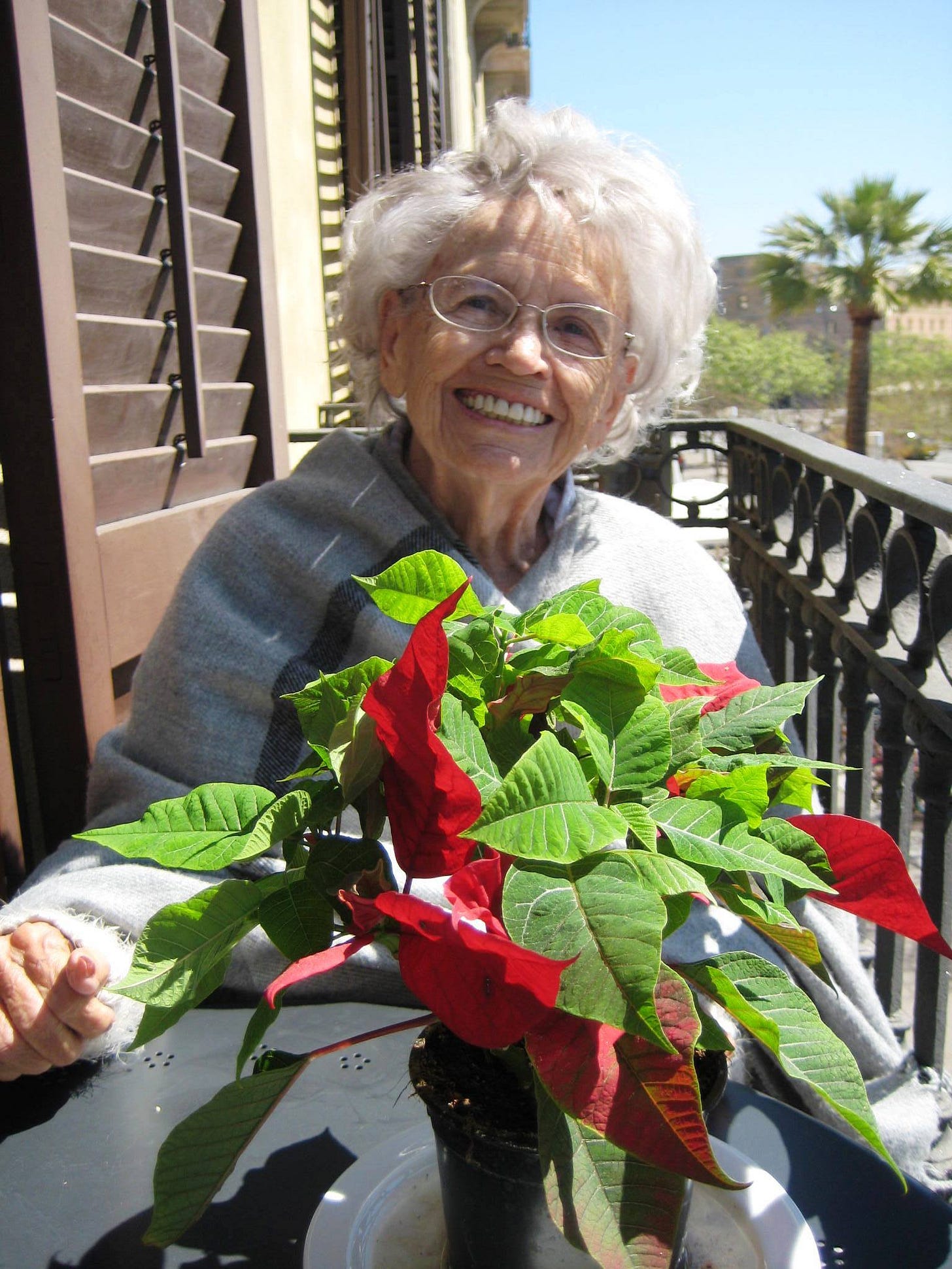
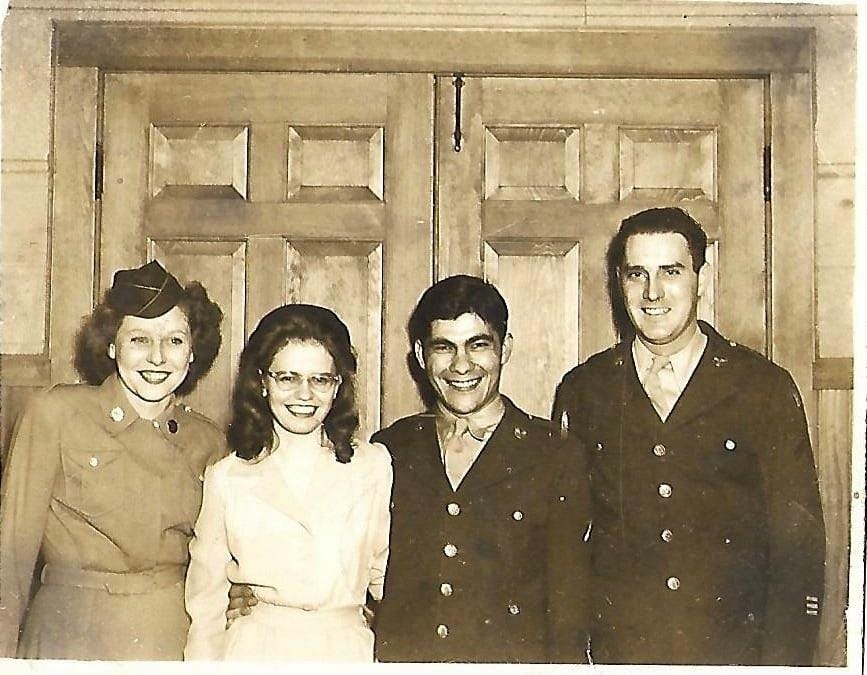
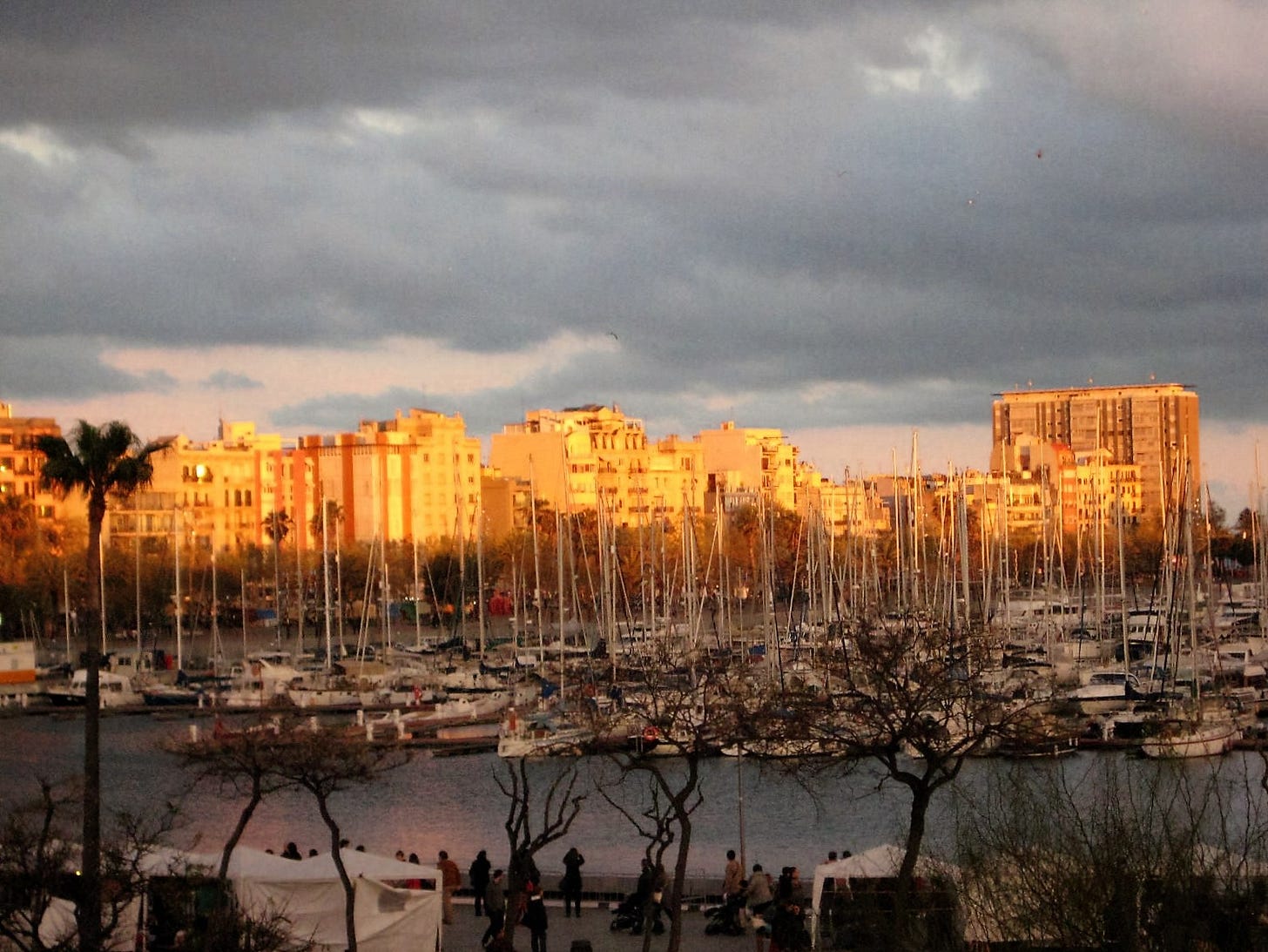
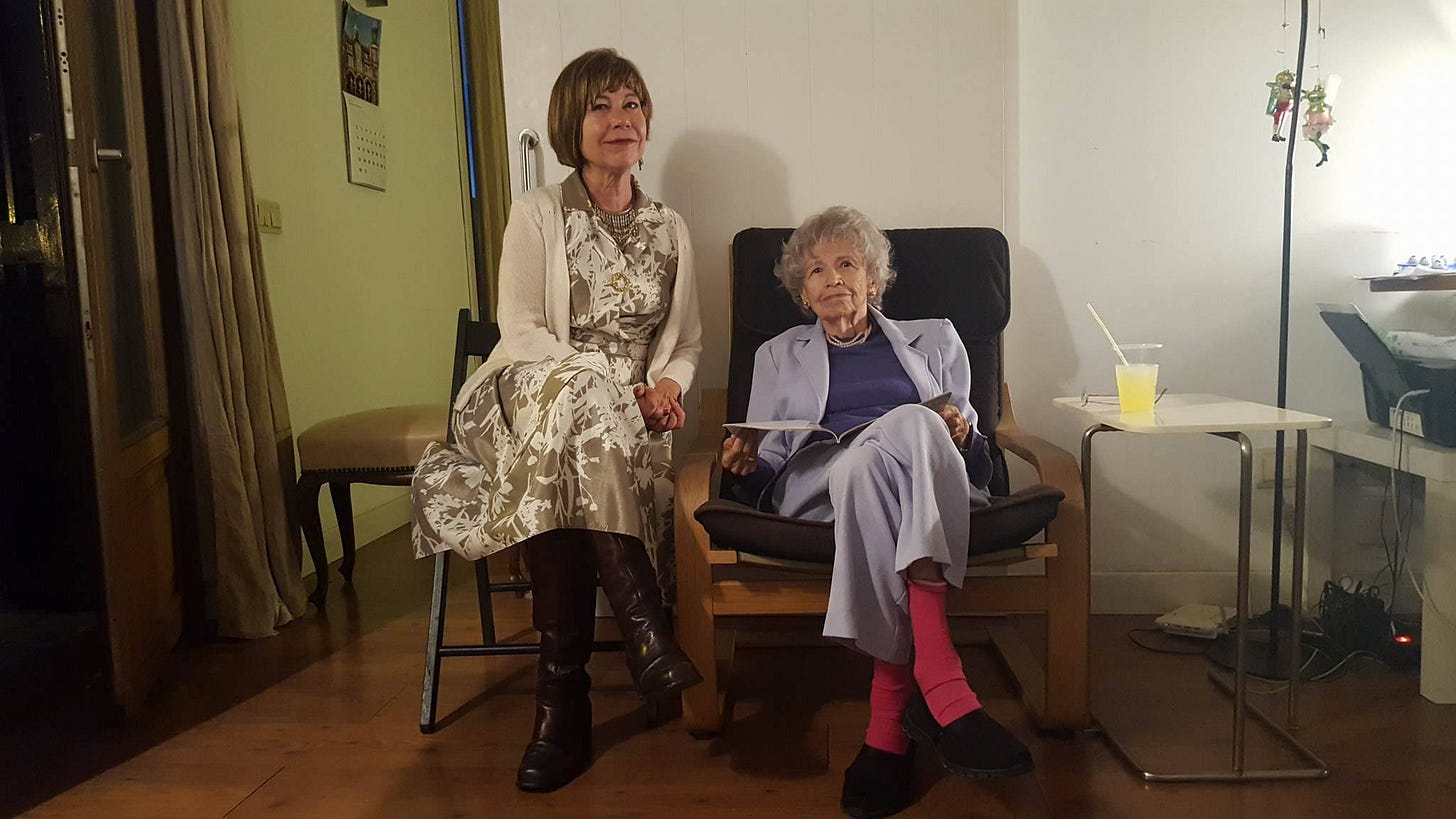
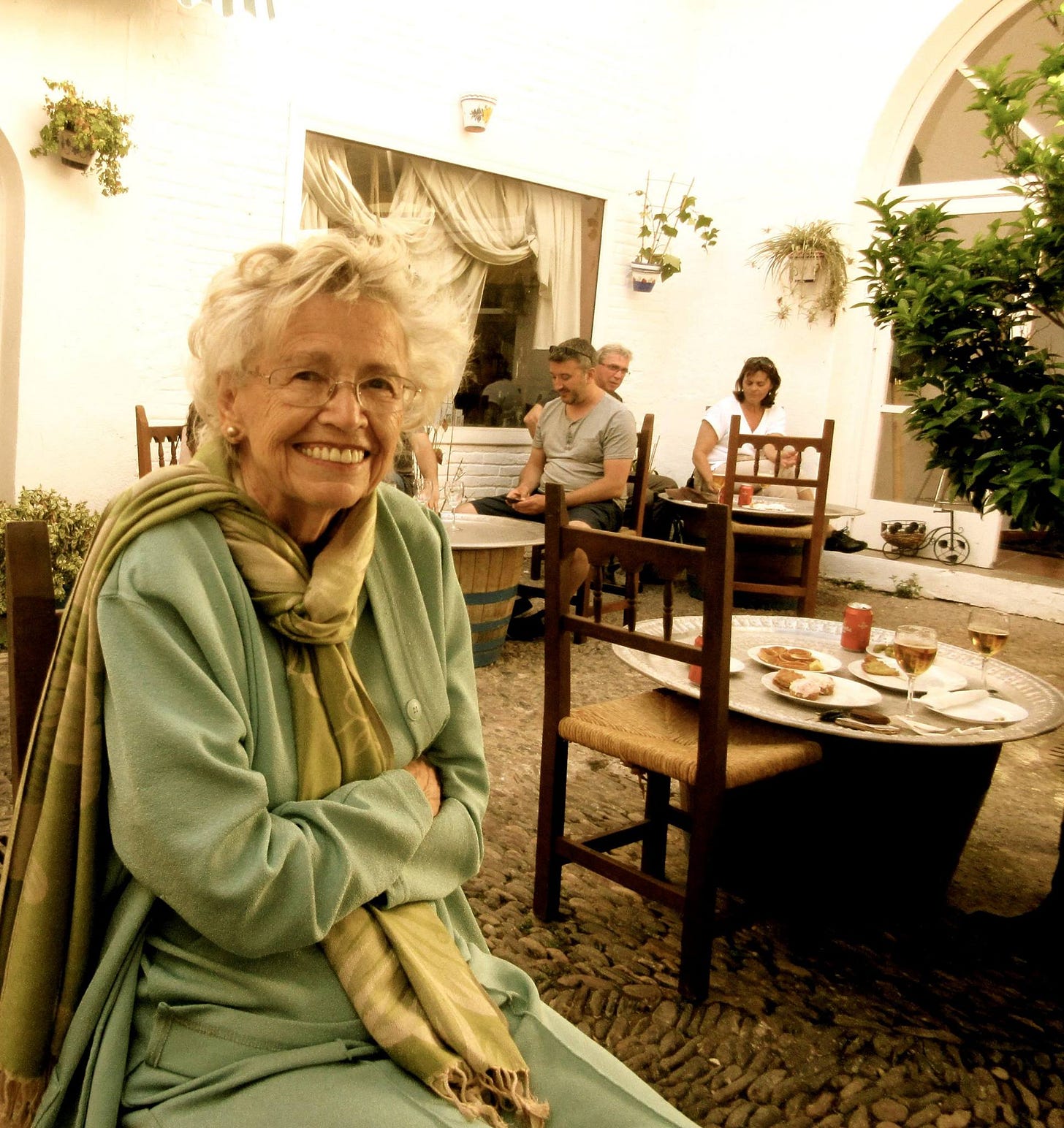
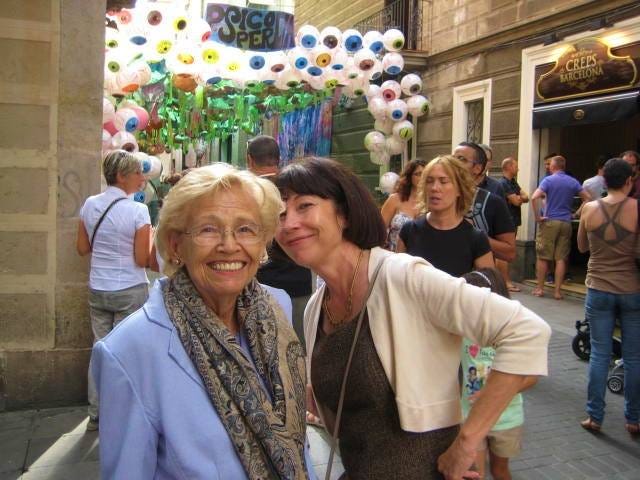
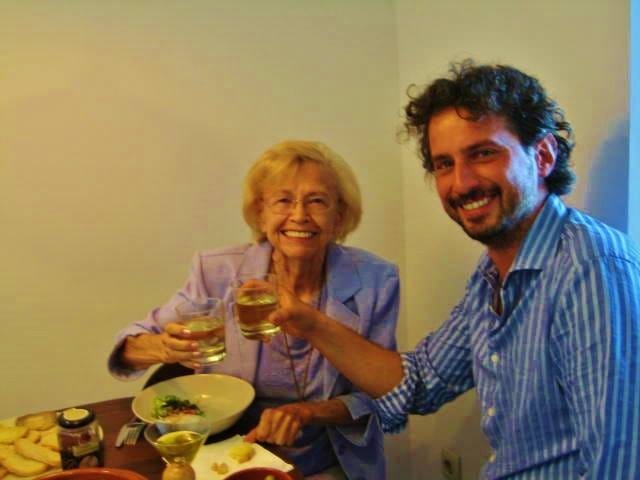
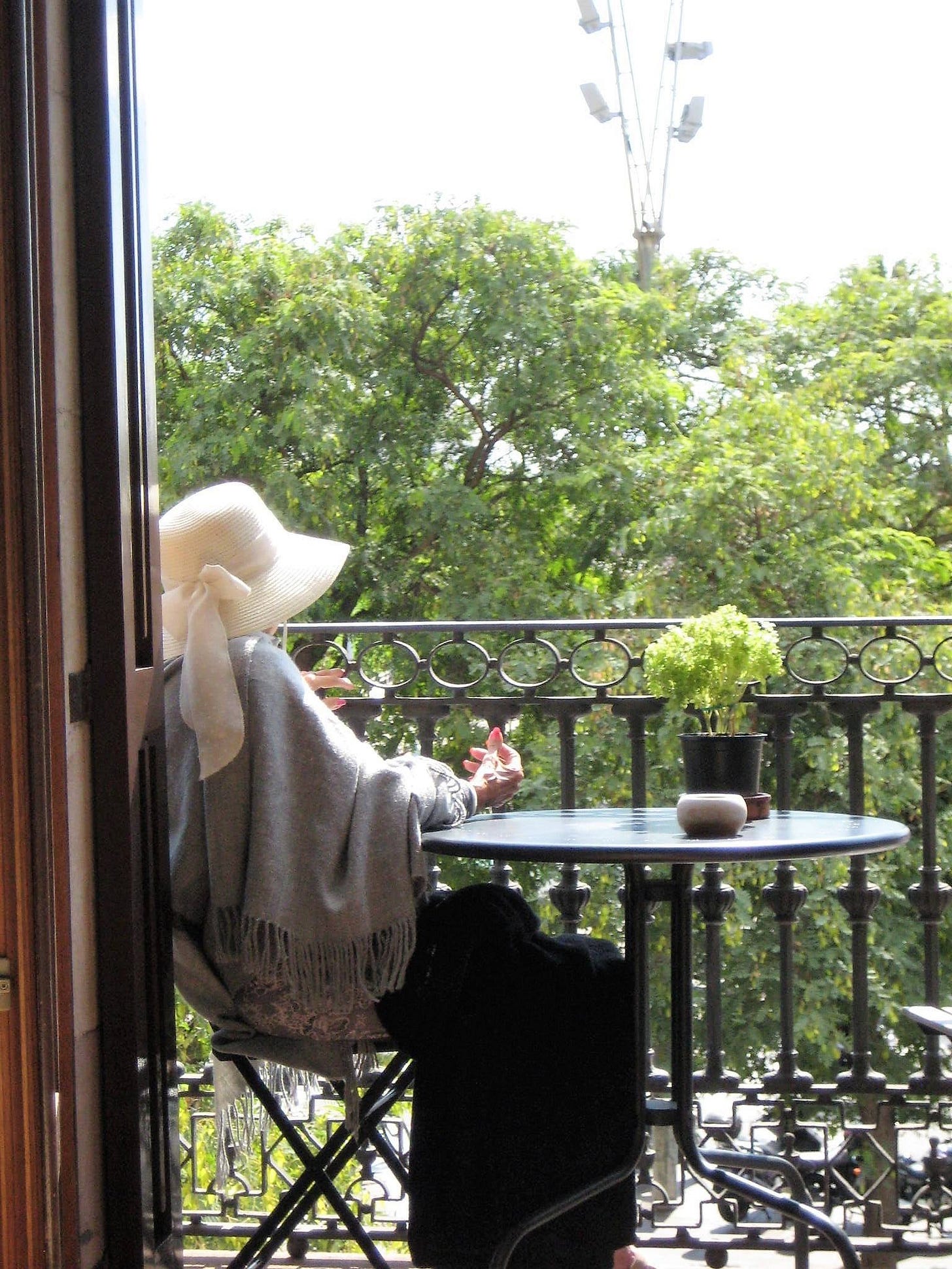
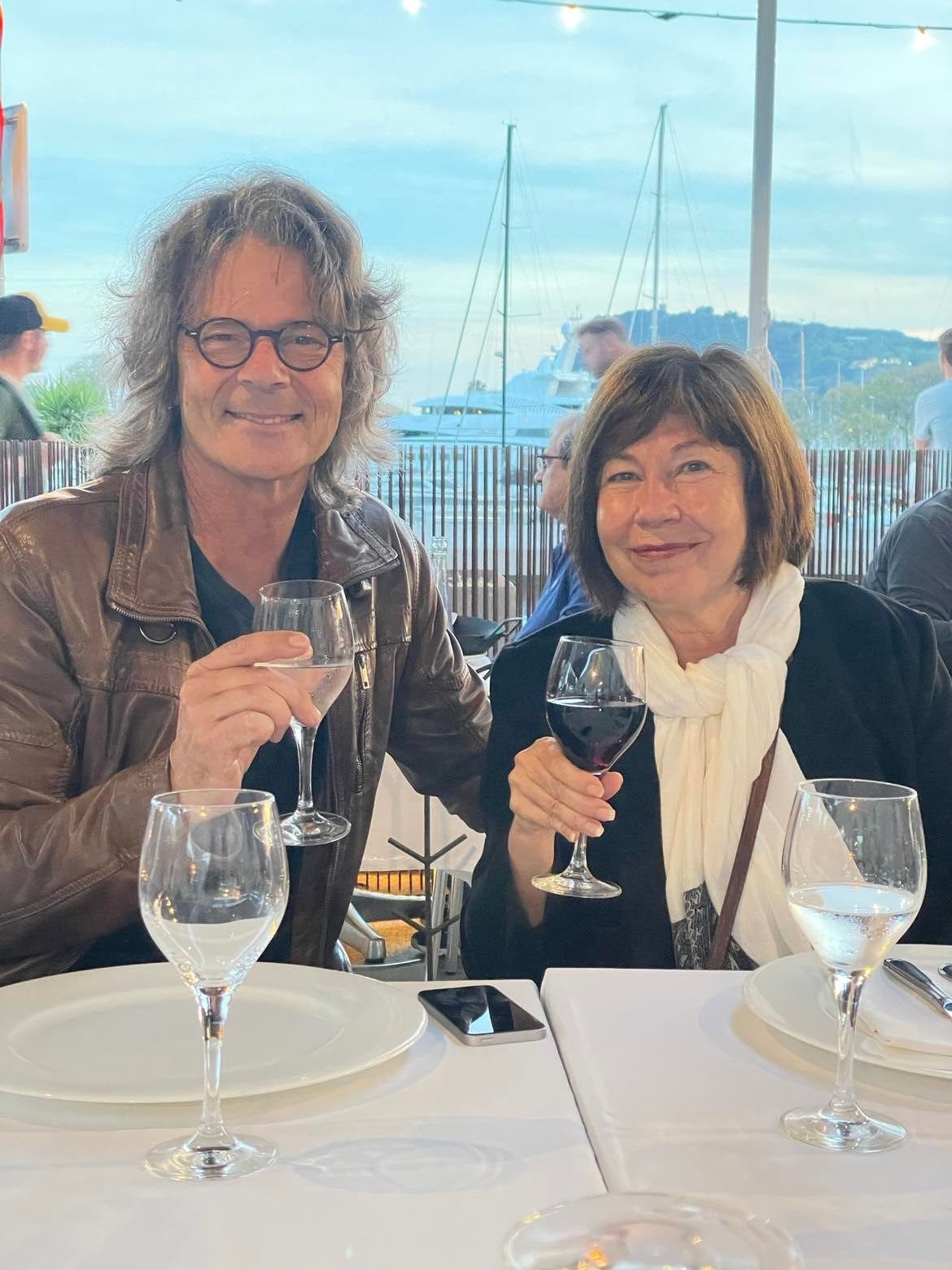
Such a lovely story and wonderful memories. Loved reading this.
I love this beautiful story about you and your mom. I think it should be read by everyone who might ever find themselves in a similar situation.